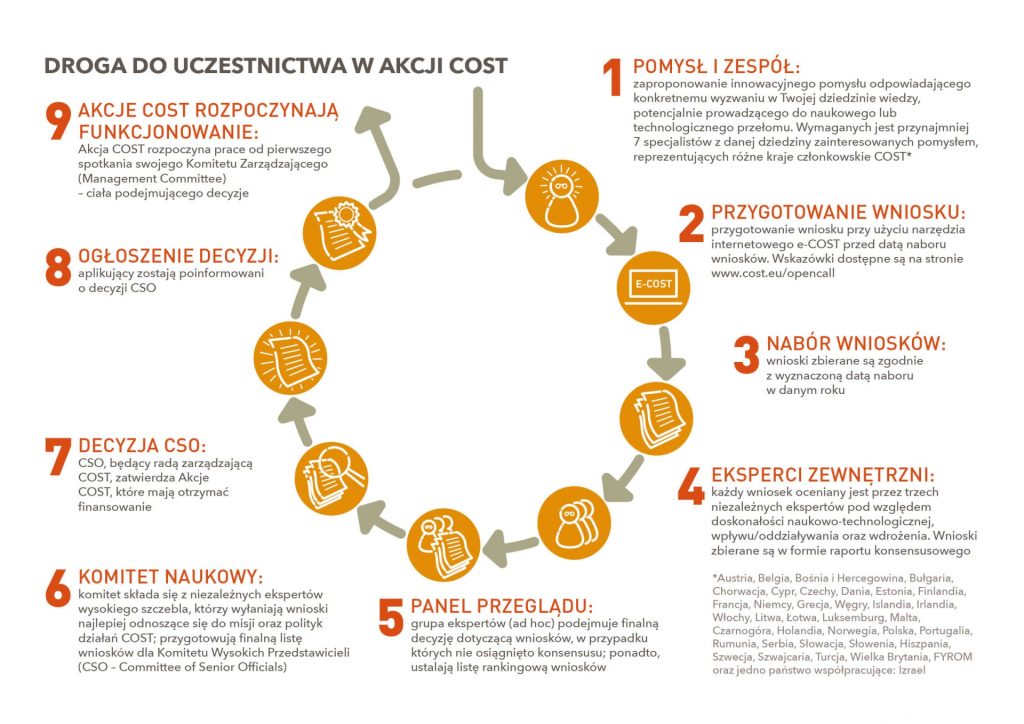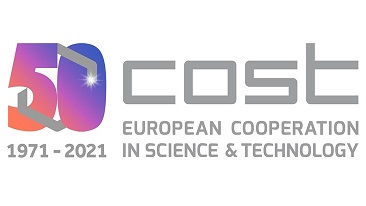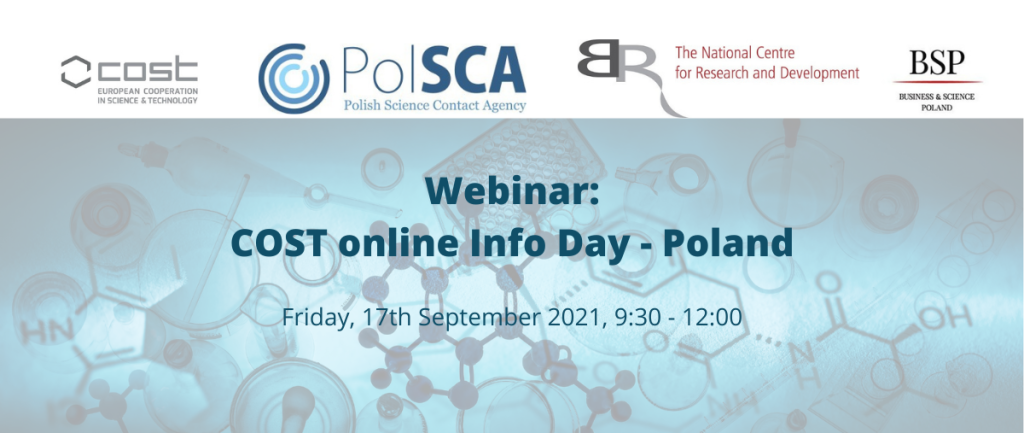COST (European Cooperation in Science and Technology) supports international cooperation in the field of research carried out under national programs. We recommend our guide introducing development in COST Actions – the next submission date will be on October 29!
What is COST?
COST (European Cooperation in Science and Technology) is an intergovernmental European institution based in Brussels, established to support international cooperation in the field of scientific research carried out under individual national programs. COST is also the oldest European research program – it was established in 1971. It currently covers 38 member states of the European Union and cooperating countries.
COST is about enabling cooperation of teams of scientists from different countries working in similar fields, for example by financial support for exchanges, meetings, conferences or publications. Importantly, COST does not fund research as such, but provides an environment for international collaboration in the so-called COST Action.
- Meetings, workshops and conferences;
- Grants for participation in conferences for PhD students and young scientists;
- Short-Term Scientific Missions (STSM) – short-term scientific and research trips;
- Training schools;
- Dissemination activities and publications.
What are COST Actions and what are the opportunities?
COST Action is a network dedicated to scientific cooperation, which is scheduled to run for four years. The network’s activities are complemented by the national research funds of its members, gathered around a bottom-up research initiative. COST does not specify whether or not it imposes areas of cooperation.
In order to initiate and launch the COST Action, it is necessary to attract participants from at least seven COST member countries, with at least 50% of them having to belong to the group of the so-called Inclusiveness Target Countries (ITC). Representatives of these countries form the Management Committee, i.e. the Managing Committee. Each COST Action has its own objectives and specific results, as set out in the Memorandum of Understanding (MoU).
An important feature of the program is its openness and flexibility. COST actions are bottom-up initiatives, where scientists from COST member countries, working at universities, research institutes, as well as public and private R&D organizations (including NGOs, SMEs and large enterprises), they can initiate them and define their subject and scope. A country’s accession to the COST Action is voluntary and only depends on local research priorities. Let us remind you that the costs of all research work are borne directly by the organizations involved, whether from their own resources or from funds obtained as part of subsidies or grants.
Scientists at any stage of their career can join COST activities, but young researchers are particularly encouraged.
Joining the COST Action is possible in the following ways:
- Participation in a competition with a proposal to initiate a new Action, where the scientist can act as its main originator or be part of the team initiating the application, representing min. 7 COST member countries. Help regarding recruitment can be obtained at the e-mail address opencall@cost.eu.
The application process is a one-step process and is implemented through the e-COST submission tool. Submitting an application requires completing part of the online application and sending a technical annex up to 15 pages. Check out the short instructional material HERE.
The competition in COST activities is open on a continuous basis, while the dates for submitting proposals are set annually, with the closest one being set for October 29, 2021. Information on how to submit applications is available HERE, including an Open Call announcement, description of the submission procedure applications, their ratings and choices – SESA Guidelines.
- Joining the already existing COST Action by joining activities on several possible levels, more about that HERE. This openness of the program to new participants is one of its characteristic features. A similar mechanism, the so-called The hop-on facility will be more widely implemented in Horizon Europe.
The database of all COST Actions (in progress and completed) can be found on the program’s website, where the search engine was made available. Interested researchers should contact directly the chairman of the Management Committee or the chairmen of the Working Groups of the Action concerned to establish cooperation. In the event that Poland does not participate in the selected COST Action, joining it requires contact with the Ministry of Education and Science, where detailed information is provided by Ms. Jadwiga Mrozowska.
- Becoming an external COST expert who evaluates the applications submitted to the COST program to initiate new Actions or participates in the evaluation of the results of the Actions. More information and expert registration HERE.

In addition, the COST website includes a database of document templates and guidelines for participation in COST Actions.
What is COST Academy?

COST Academy is an initiative supporting COST Actions, which offers training, workshops and webinars. Face-to-face meetings are held at COST’s headquarters in Brussels, but webinars are also offered.
COST Academy training courses are aimed at:
- Grant Holders, who can take part in workshops, seminars, forum for the exchange of experiences or use the online library offer;
- Action Chairs, for which a forum and networking event was prepared to share good practices as well as training on the structures and competences of EU institutions;
- Science communication managers who want to take part in media training, as well as learn how to use social media, storytelling, creating presentations or editing video materials;
- Young scientists and scientists from Inclusiveness Target Countries are offered workshops on leadership competences and implementation in the activities of the Management Committee of the Action.
The closest scheduled events can be found in the COST Academy calendar.
Cost Info Day – Poland
The COST Info Day – Poland event was a good opportunity to learn more about COST. It took place on September 17, 2021 and was organized in the form of a webinar by the Office of the Polish Academy of Sciences in Brussels in cooperation with the Office of the National Center for Research and Development in Brussels.
The aim of the information meeting is to provide participants with the most important information on networking and cooperation opportunities in the field of scientific and technical research offered by the European Cooperation in the field of Scientific and Technical Research – COST.

The meeting was opened by the COST director – Dr. Ronald de Bruin, who presented the participants with the basic facts about the program, while experts from the COST Office discussed detailed information on participation in the COST Actions and how to submit an application, including the current competition. In the second part of the meeting, the Polish COST coordinator – Ms Jadwiga Mrozowska (MEiN) and invited scientists from Poland involved in COST, shared their experiences and best practices in preparing applications and participating in COST Actions. During the meeting, the Academy was represented by Dr. Piotr Wciślik (Institute of Literary Research of the Polish Academy of Sciences in Warsaw), who as part of COST implements the New Exploratory Phase in Research on East European Cultures of Dissent (www.nep4dissent.eu) project.
The full agenda of the event and the speakers’ bios are available HERE.
Over two hundred participants from all over Poland joined the meeting online, including nearly 100 people associated with the Institutes of the Polish Academy of Sciences. More about the event and statements of Polish participants of the Campaign can be found on the COST website.


